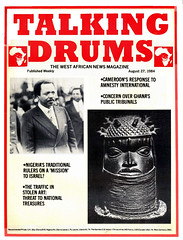Whispering Drums With Maigani
by Musa Ibrahim
The making of a people (1)
First, they had to be taken out of Egypt where they had been subjected to a "wicked form of slavery, living as second class citizens." Through Moses, God's powers were manifested and with one plague after another, Pharaoh the King of Egypt was eventually coaxed into letting "my people go." Through the Red Sea and into a seemingly endless wilderness, the people marched on determined to reach Canaan, the land the Good God had told them was flowing with milk and honey and which was going to be their own for keeps. With God at their every beck and call, they were able to wobble themselves through one crisis and another in their march towards Zion with considerable successes leaving behind evidence of ruins and plunder. When they finally arrived after much human loss, they besieged God and raved at him to "give us a King to govern us like all the other nations." Since then there have been troubles.
Hitler came with his anti-semitic crusade aimed at the total annihilation and extinction of this highly "over-pampered" race for reasons best known to him. And at this stage it seemed God was either asleep or must have travelled to some unknown destination or else over six million of "His people" would not have faded into oblivion in the wake of Hitler's pogrom or genocide.
The parable told here has some far-reaching symbolic implications that stretches beyond Israel. As the biblical story of the children of Israel kept unfolding, one pervasive image and character of the people that kept coming into the limelight is that of ungraciousness, for, in spite of all the goodies, the miracles and the manna from heaven, there was no iota of gratefulness to God in them. Instead, what one kept reading are one grumble too many.
I was in Lagos last year for Nigeria's elections. In the first press conference after his re-election for a second term, ex-President Shehu Shagari in answer to a question posed to him by a journalist from the United Press International (UPI) as to why messages of congratulations have not been sent to him (Shagari) by the other five political party leaders, answered: "I will tell you one thing about Nigerians. They love to complain. Right now my opponents are complaining that the elections were rigged but they know as much as I do that they were not. Still, they cannot accept the fact that I won and they lost ... They will keep complaining because they are Nigerians..."
"Today, none of those imagined problems and the imaginary shortages of the Shagari days can hold a candle to the realities of the Buhari traumas. If during Shagari people were suffering and smiling, in Buhari days people are suffering and quenching..."
There is this saying that one does not see anything good or valuable in what he has until he loses it. Thus it is that during the entire four year period of the Shagari administration, there was no day under the sun in which Nigerians did not find something to com- plain about. And in most of these cases, the government often went out of its way to listen to these complaints and try to provide solutions to those considered genuine. And as the government's magnanimity towards the people continued, the people's graciousness and gratefulness were replaced with greed and all Shagari and his government got was more complaints and grumblings about imaginary shortages and sufferings.
Today, none of those imagined problems and the imaginary shortages of the Shagari days can hold a candle to the realities of the Buhari traumas. If during Shagari people were suffering and smiling, in Buhari days, people are suffering and quenching. Take for instance this extract from one of the Nigerian dailies: "As the biting noose of austerity tightens round the neck of many Nigerians, increasing numbers of its victims are giving way to desperation, sometimes leaving a trail of fatal consequences. Barely a week after a newspaper reported the story of a Kano man who opted for suicide when he discovered his pregnant wife had given birth to a set of twins, another person, this time a woman, has given up the survival struggle by taking her life..." There are lots of other casualties.
And there are few complaints because of the gag from decrees from the Tunde Idiagbon legal assembly. But with the desperate measures being embarked upon by the victims, such as terminating their lives, there is a rumour half serious and half joke- that this is the only way for people to show Buhari and his military junta that they are disenchanted with them. The pity is that the leaders seem not to care, because, in the words of the learned Roman, Marcus Tullius Cicero, "most men, however are inclined to forget justice altogether, when once the craving for military power or political honours and glory has taken possession of them... for when crowns are at stake, no friendship is sacred, no faith shall be kept."
This is essentially what has gripped and maddened and convulsed the Buharis and the Idiagbons of Nigeria, and I am wondering how many dead Nigerians will make them come to terms with the harsh realities of their time.
